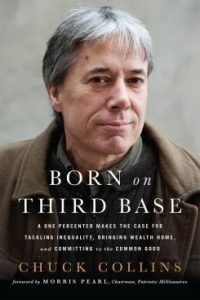In June 2000, Congress voted to abolish the estate tax. President Bill Clinton pledged to veto the bill, arguing we should reform but not repeal the tax. The White House asked my organization, the Institute for Policy Studies, for help recruiting business leaders to stand with the president at the veto press conference.
We enlisted Martin Rothenberg, the owner of several technology companies. Speaking at a press conference in the West Wing of the White House, Rothenberg explained, “My wealth is not only a product of my own hard work. It also resulted from a strong economy and lots of public investment in others and me.”
Get Evonomics in your inbox
The son of first-generation immigrants, Rothenberg grew up in Brooklyn. “My parents didn’t have any money. But I went to great public schools, with excellent teachers. Someone else paid for my education.
“There was a great local public library—open on weekends and evenings,” he continued. “When I was about 12 or 13, I got very interested in electricity and radio. When I came into the library, the librarian would say, ‘Martin, I have a book for you.’ Someone else paid to keep that library open and pay that librarian’s wages.”
Rothenberg attended college for free on the GI Bill. His graduate school education was also free because he participated in a fellowship program that forgave his loans after several years of teaching. “Someone else paid for my college and university studies,” he noted.
After school, he went into the emerging high-tech field, a sector built with huge public investments in research and technological infrastructure. Then he started his own private company, founded on a platform of publicly funded research. “So that’s in large part where my wealth came from.
“When I started my company, where did I find qualified employees?” he asked, waving his hands. “I hired them from the university, where they were trained with government scholarships! Someone else paid to train my employees.”
Rothenberg sold his company for $30 million. But like many entrepreneurs he started another company and continues to be engaged in a number of enterprises.
“All along the way, other people paid for my early education, and graduate studies,” Rothenberg concluded. “The entire field of Internet technology I work in was built with public investment. I didn’t do it alone.
“So should I pay an estate tax?” He paused and looked at President Clinton and the crowd of reporters. “Of course I should!” he cried passionately. “Don’t I have an obligation to pay back to the society that has made everything possible for me? Don’t I have an obligation — a duty — to ensure that other kids, who grow up poor like I did, should have the same opportunities for education and employment?
“I have no problem paying an estate tax. I’ve never once heard my children complain that part of their inheritance will go toward an estate tax. I was able to provide well for my family, and, upon my death, I hope taxes on my estate will help fund the kind of programs that benefited me and others from humble backgrounds — a good education, money for research, and targeted investments in poor communities — to help bring opportunity to all Americans.”
President Clinton approached the rostrum and shook Rothenberg’s hand. He was visibly moved and momentarily speechless before leaning into the microphone, shaking his head and saying, “This is the best of America.”
Ayn Rand Has a Point: Individuals Matter
Martin Rothenberg’s “I didn’t do it alone” is a striking contrast with the “No one helped me — so leave me alone” stories that I often hear.
Thinking about Charlie from Hillsborough and then listening to Martin’s story makes me realize that we need a more nuanced narrative of success, one that appropriately celebrates the gifts of individuals — but also chronicles the complex constellation of other forces at work.
Is there an alternative to the Great Man Theory of Wealth Creation? Is there a more balanced narrative that recognizes the role of the individual while fixing a more accurate lens on other factors?
Individual effort does matter, and we should celebrate it. Some people accumulate great wealth because of their hard work, extra effort, intelligence, creativity, faithfulness, and sacrifice. And leadership does make a difference, especially when presiding over large complex organizations — as do some of those CEOs we love to hate because of their oversized pay packages and short-term profit grabbing.
Our society needs these individuals with leadership abilities and would be impoverished without their skills in the world. They should be appreciated for their efforts with social recognition and rewarded with reasonable material rewards.
Most people rightly consider Ayn Rand as an apostle of extreme individualism and libertarian views about government. The philosophy she infused into her writings is yet another object of debate in our contemporary political-culture wars. But I have read The Fountainhead and Atlas Shrugged
, and the thing I like about Ayn Rand is that her individuals are heroic. They buck the trend and take the road less traveled. They work hard and with precision. They take pride in their work and make the railroads run, the steel mill hum, and the buildings soar. They are doers.
I appreciate characters who don’t go along with the herd, who value freedom and individual conscience.
But what Ayn Rand missed was the role of society, and the importance of public infrastructure and investment in creating the conditions for wealth creation and preservation. Her now-famous characters and their achievements seem to float outside any societal or ecological commons that makes their existence and activities possible. Those characters may be admirable, but the story told about them is incomplete.
After listening to hundreds of real-world “I did it alone” stories, what I’ve come to appreciate is the wounded voice of the people who tell them. Behind the heroics are sacrifices and losses. To work hard is to miss out on life’s other delights. It means missing one’s family and loved ones and sacrificing one’s health and life balance.
In a cultural sense, we need to lay a wreath at the altar of individual achievement—to acknowledge the truth of people’s sacrifices on both sides of the wealth and income divide. If we ignore the role of the individual—the small and large acts of heroism that people undertake—we cannot have a conversation about societal factors in wealth and success.
How are these sacrifices any different, you might ask, from those of the minimum-wage worker who misses important moments in her children’s lives by working two jobs to simply pay the rent and feed the family? Such is the story of many low-wage workers, and they have little wealth and security to show for their heroic acts. There are also many gifted people who contribute to the world in vital ways that do not lead to great wealth. What about teachers, coaches, and music instructors who choose to serve the next generation rather than command higher salaries in other occupations? Or those working in nonprofits to protect our environment or improve the lives of others? These people feel compensated in part by the inherent meaningfulness of what they are doing, but they are often undervalued and sometimes paid less than a livable wage.
For people like me who were born on third base, it is easy to see how I didn’t do it alone. It is more complicated with the first-generation entrepreneurs I know. How do we unpack the various threads of individual temperament, social privilege, and luck in any of our lives? We can’t deny that there are some individuals who seem to stick out for various reasons—some personal qualities, creativity, a spark. But weighing those qualities against other factors such as historical timing, social investments, or economic environments can prove daunting.
Donald Trump frequently tells his business success story, but he often omits the glide path to gold embodied in his life. His father, Fred Trump, was a successful and well-connected real estate developer in New York City. The elder Trump made a lot of his money building Federal Housing Administration (FHA)–financed new homes in Brooklyn. During World War II, he got the contract to build FHA housing for US naval personnel near major shipyards along the East Coast. Donald Trump not only inherited a real estate empire valued between $40 million and $200 million, but he also received family training, social networks, and financial connections.
U.S. culture appears to have nailed the “individual” part of the equation. We see almost everything in terms of individual action, not society. Our business magazines, talk show interviews, and folklore are chock-full of modern-day Horatio Alger testimonials that start with the word I.
Perhaps this individual tilt is in the nature of the questions we ask: Tell us, Mr. Welch, how did you lead General Electric from a $14 billion company to a diversified conglomerate with market capitalization of $410 billion? What were you thinking, Mr. Zuckerberg, when you launched Facebook? What personal qualities and character traits do you have that made this possible?
It is no wonder that many wealthy people think they are so special and smart, given the way their stories are told. Imagine being surrounded by fawning exultation and people clinging to your every utterance, encouraging you to believe that it is all about you. This culture creates a dangerous threat to maintaining one’s humility.
One powerful example of this myth of deservedness in action is the “makers” versus “takers” narrative. In this explanation for US inequality, the virtuous “makers” are the hardworking job creators, the engines of the train, who also pay most of the taxes. And the “takers” are freeloaders, getting government handouts and not contributing.
This catchy narrative has punishing implications. It attaches a stigma of shame to those who need help, including the most vulnerable segments of our society—the young, the old, those with mental illness and disabilities. It stigmatizes people who ask for help or confess their real needs. And it discourages those celebrated as successful from confessing to help they get along the way.
The alternative is a “we did it together” story. Over our lifetimes, we all have needs and gifts to share. We are all dependent and interdependent. There is a fluidity of giving and receiving that cannot be reduced to a dehumanizing binary set of labels that flow from crude economic measurements.
 This article is excerpted from Chuck Collins’ new book Born on Third Base
This article is excerpted from Chuck Collins’ new book Born on Third Base, and is reprinted here with permission of the publisher.
2016 October 6
Donating = Changing Economics. And Changing the World.
Evonomics is free, it’s a labor of love, and it's an expense. We spend hundreds of hours and lots of dollars each month creating, curating, and promoting content that drives the next evolution of economics. If you're like us — if you think there’s a key leverage point here for making the world a better place — please consider donating. We’ll use your donation to deliver even more game-changing content, and to spread the word about that content to influential thinkers far and wide.
MONTHLY DONATION
$3 / month
$7 / month
$10 / month
$25 / month
You can also become a one-time patron with a single donation in any amount.
If you liked this article, you'll also like these other Evonomics articles...
BE INVOLVED
We welcome you to take part in the next evolution of economics. Sign up now to be kept in the loop!
























